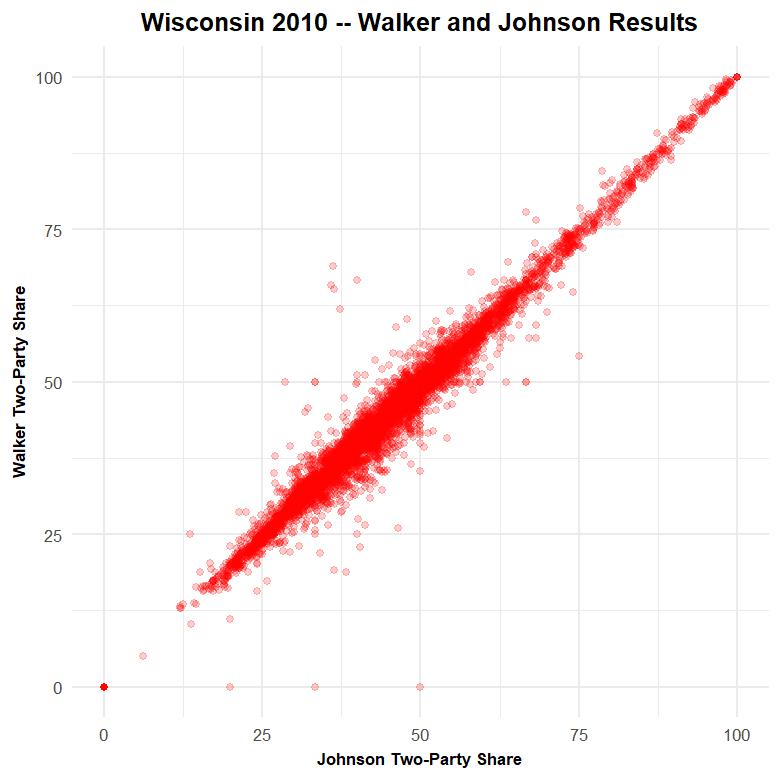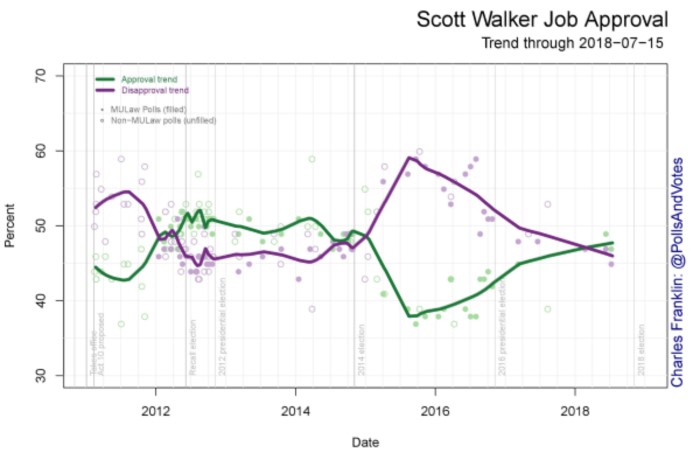As far as I know, Time magazine never ran a cover calling Wisconsin Gov. Scott Walker the “Republican Savior.” But at one time, he fit the bill.
Walker won the governorship of Wisconsin for the first time during the Republican wave of 2010. He governed conservatively, won a recall election, and then won re-election in 2014. In 2015, he ran for the Republican presidential nomination, pitching himself as a conservative who could win in unfriendly territory. It was a solid pitch, and I honestly thought Walker was the favorite to win the GOP nomination for much of the first half of 2015.
But then Donald Trump happened.
Now Walker is running for a third term as Wisconsin governor (he isn’t term-limited), and Trump might just cause problems for him again.
Walker, Johnson, Trump, and Obama
Scott Walker is an effective candidate—he managed to win and hold the governorship in Wisconsin while amassing a solidly conservative governing record. But, unlike some other successful GOP governors, Walker doesn’t seem to be immune to national level trends. State issues were obviously important in Walker’s runs (as they are in most gubernatorial races), but the national conditions of 2018 don’t look as helpful as the conditions of 2010 or 2014.
At times, that has worked to his benefit. In 2010 Walker was running for governor for the first time and Tea Party favorite Ron Johnson was attempting to unseat sitting Democratic Sen. Russ Feingold. Despite running for different offices and dealing with different sets of issues, Johnson won his race by 4.8 points and Walker won by 5.8 points.
That’s not a huge difference. And ward level results suggest that Johnson and Walker shared a lot of voters

In this scatter, every ward is a point and its position shows what percentage of the two party vote Walker and Johnson got. The points mostly fall pretty close to a straight diagonal line—meaning that if Walker got a certain percentage of the vote anywhere, Johnson probably got a similar share.
That graphic might feel ordinary (two Republicans in the same state running at the same time getting similar numbers of votes is, well, not crazy), but the similarities are important here. Johnson was running for a senate seat and Walker was running for governor.
National political conditions (e.g. Obama’s unpopularity and public backlash to the Affordable Care Act) clearly mattered in Johnson’s race. A simple, fundamentals-based model (which uses statewide presidential approval, incumbency, and a “bad candidate” indicator variable to predict results) did a reasonably good job (given the limitations of the model) of predicting the results of Johnson’s race given the (it gave his opponent 49.9 percent of the vote, and he got 47 percent).
It’s not hard to imagine that those same national conditions helped Walker. Walker and Johnson shared a lot of voters, and strong GOP turnout in 2010 likely helped both men.
In 2014 Walker won re-election by 5.7 points—basically the same margin that he won by in 2010. That makes sense—the national environment was slightly less Republican in 2014 than 2010 (as measured by the House popular vote and generic ballot polls), but Walker was an incumbent (which, all else being held equal, is typically an advantage). Moreover, he did about as well as the statewide partisanship of Wisconsin suggested he would.
Obviously national politics doesn’t explain everything about Walker’s victories. Walker was running for governor (not senator) and gubernatorial campaigns often revolve around state issues. Maybe more importantly, Walker won a high-turnout recall election in June of 2012—a race that existed because of state level conflicts and didn’t coincide with a national GOP wave election.
But national politics is probably at least part of the story in 2010 and 2014. Republicans were energized in both years and turned out strongly. And it couldn’t have hurt Walker to have an unpopular Democratic president in office for both of his regularly-scheduled wins.
Walker will be heading into a somewhat different situation in 2018. An unpopular Republican is in the White House. If opinion about Trump bleeds into Walker’s race, the governor might have some problems. Put simply, Walker will probably have to convince some voters who are casting their ballot for Democratic Sen. Tammy Baldwin (who currently has a wide lead and a roughly 95 percent win probability in our SwingSeat model) that they should also vote for him as well.
That’s possible, but far from guaranteed. According to the recent polling data (data and graphic graciously provided by Charles Franklin), Walker’s net approval is currently not so far off where it was on Election Day 2014.

Moreover, in a July Marquette poll, Walker had a 47 percent approval rating and Trump had a 42 percent rating in Wisconsin. That said, Morning Consult found Trump and Walker with similar approval ratings.
In other words, Walker’s wins are probably a mix of state-specific, candidate-specific, and national factors. But this time, the national element of that mix is a negative for Walker—and that could create real problems for him.
Nuts and bolts—it’s close but your mileage may vary
At this point, the polls and the handicappers are telling two different stories. For major handicappers (Cook, Sabato, Inside Elections, and Governing) rate the race as “Leans Republican” while RealClearPolitics says it’s a toss-up. Two recent polls—from Emerson and NBC/Marist—show Walker down by 13 and 7, respectively. Earlier polls are better for Walker (e.g. a June Marquette poll had him up by four) but the overall outlook of the polls is arguably something closer to Leans Democratic (CNN’s Harry Enten translated the Cook rating to a 70 percent win probability, though his polls as of last week implied something closer to 25 percent)
In other words, your mileage may vary here. The ratings should be comforting to Walker, and he has a strong record of winning in Wisconsin. But the last couple polls have been tough for him, and the national environment is tougher than usual for Republicans. It’s hard to argue that either party has this race locked up at this point, and reasonable people could make the case that Walker starts either ahead or behind. But it’s tough to look at Trump’s overall popularity and count the president as anything better than a liability for Walker.
